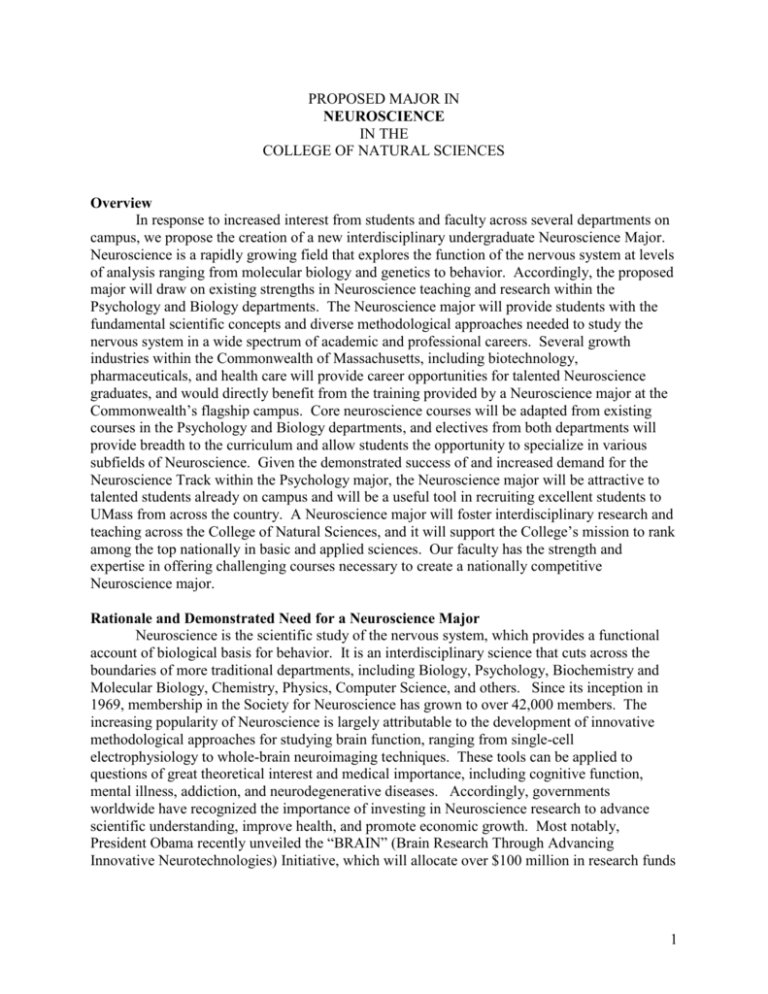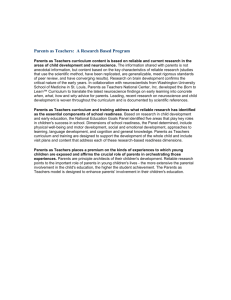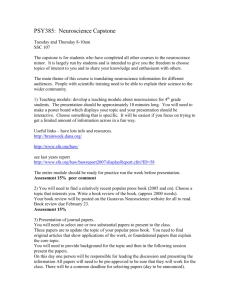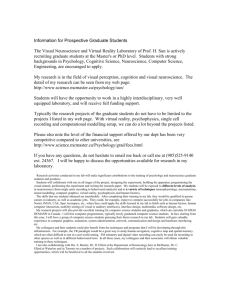Neuroscience Undergraduate Major - The College of Natural Sciences
advertisement

PROPOSED MAJOR IN NEUROSCIENCE IN THE COLLEGE OF NATURAL SCIENCES Overview In response to increased interest from students and faculty across several departments on campus, we propose the creation of a new interdisciplinary undergraduate Neuroscience Major. Neuroscience is a rapidly growing field that explores the function of the nervous system at levels of analysis ranging from molecular biology and genetics to behavior. Accordingly, the proposed major will draw on existing strengths in Neuroscience teaching and research within the Psychology and Biology departments. The Neuroscience major will provide students with the fundamental scientific concepts and diverse methodological approaches needed to study the nervous system in a wide spectrum of academic and professional careers. Several growth industries within the Commonwealth of Massachusetts, including biotechnology, pharmaceuticals, and health care will provide career opportunities for talented Neuroscience graduates, and would directly benefit from the training provided by a Neuroscience major at the Commonwealth’s flagship campus. Core neuroscience courses will be adapted from existing courses in the Psychology and Biology departments, and electives from both departments will provide breadth to the curriculum and allow students the opportunity to specialize in various subfields of Neuroscience. Given the demonstrated success of and increased demand for the Neuroscience Track within the Psychology major, the Neuroscience major will be attractive to talented students already on campus and will be a useful tool in recruiting excellent students to UMass from across the country. A Neuroscience major will foster interdisciplinary research and teaching across the College of Natural Sciences, and it will support the College’s mission to rank among the top nationally in basic and applied sciences. Our faculty has the strength and expertise in offering challenging courses necessary to create a nationally competitive Neuroscience major. Rationale and Demonstrated Need for a Neuroscience Major Neuroscience is the scientific study of the nervous system, which provides a functional account of biological basis for behavior. It is an interdisciplinary science that cuts across the boundaries of more traditional departments, including Biology, Psychology, Biochemistry and Molecular Biology, Chemistry, Physics, Computer Science, and others. Since its inception in 1969, membership in the Society for Neuroscience has grown to over 42,000 members. The increasing popularity of Neuroscience is largely attributable to the development of innovative methodological approaches for studying brain function, ranging from single-cell electrophysiology to whole-brain neuroimaging techniques. These tools can be applied to questions of great theoretical interest and medical importance, including cognitive function, mental illness, addiction, and neurodegenerative diseases. Accordingly, governments worldwide have recognized the importance of investing in Neuroscience research to advance scientific understanding, improve health, and promote economic growth. Most notably, President Obama recently unveiled the “BRAIN” (Brain Research Through Advancing Innovative Neurotechnologies) Initiative, which will allocate over $100 million in research funds 1 to map human brain function using new neurotechnologies. Such investments will drive future developments in this dynamic field. The popularity of Neuroscience fosters great student interest and growing institutional cachet. A number of local private colleges (including Amherst, Smith, and Mt. Holyoke) have started Neuroscience programs, but because of the interdepartmental nature for the field, it has taken longer for Neuroscience undergraduate programs to develop at large universities. There are notable exceptions at Cornell and Brown, both of which have particularly popular Neuroscience majors. Until recently there were no Neuroscience majors at public universities in New England, but the University of Vermont started an undergraduate major in Neuroscience in 2011. Student interest in Neuroscience will make the major a draw for recruiting students to UMass; conversely, if we do not start a major and other universities do, we will lose students interested in this major to other universities. UMass currently has a strong commitment to Neuroscience, organized as an interdisciplinary Neuroscience & Behavior (NSB) graduate program that draws on the Psychology, Biology, Biochemistry and Molecular Biology, Chemistry, Computer Science, Veterinary and Animal Science, and Kinesiology departments, as well as the four colleges in the Five-College community. This interdisciplinary structure will provide the framework in which an undergraduate Neuroscience major can exist. Currently, the only named option for students interested in Neuroscience is to join the Neuroscience Track, which is housed within the BSPsychology major. Placing the Neuroscience Track within one major is not conducive to the interdisciplinary approach that is essential to the field, and it discourages some students who are more interested in a cellular and molecular approach to Neuroscience. Moreover, students have voiced concerns that receiving a BS in Psychology despite rigorous natural science coursework makes them less competitive for graduate programs, medical schools, or research positions. An official Neuroscience major will attract talented students to UMass and will provide students with the recognition and prestige that they deserve for their work in Neuroscience. Mission and Goals Neuroscience is a highly interdisciplinary field, encompassing multiple levels of analysis and requiring a breadth of knowledge ranging from molecular biology to behavior. The mission of the Neuroscience major is to train undergraduate students in contemporary Neuroscience by familiarizing them with the wide range of disciplines that make up the field and providing them with opportunities to participate in Neuroscience research. Through the combination of a wide spectrum of academic coursework and hands-on experience, the Neuroscience major will offer the strong background that students need to pursue graduate school or a professional career in Neuroscience. The major will rely on the participation of NSB faculty members whose expertise covers the various disciplines of the field. The specific goals of the major are to: 1. Provide a strong foundation in Neuroscience The major will offer a series of intensive core courses covering basic science disciplines and main Neuroscience fields, as well as investigative labs required to experience and understand the experimental methods of modern neuroscience. 2. Offer advanced study in specific areas 2 In addition, the major will offer a series of electives for in-depth study of one or more areas of Neuroscience. By providing course options in the Psychology and Biology departments, students can tailor their advanced course work to specific topics of interest. 3. Foster research skills and critical thinking Students will develop research skills and critical thinking though interactive classes and involvement in Neuroscience labs across campus. 4. Prepare students for careers in neuroscience The major will provide sufficient training in academic coursework and research for admission to Neuroscience graduate programs and/or for research positions in neuroscience labs and related fields. In particular, Neuroscience majors will be well equipped for careers in fields in where the state of Massachusetts is investing heavily, such as biotechnology, pharmaceuticals, health care, and public health policy. Neuroscience Major Curriculum The proposed Neuroscience major will offer a rigorous curriculum that draws on demonstrated strengths of the Biology and Psychology departments by modifying existing courses to accommodate students with a specialized interest in Neuroscience. Many of the requirements are similar to those of the highly successful BS-Psychology Neuroscience Track, which currently includes over 175 talented students. In order to create a truly interdisciplinary major, we have added additional Biology requirements and core Neuroscience courses that will involve faculty from both the Biology and Psychology departments. The program of study provides students with a strong background in the natural sciences, similar to other majors in the College of Natural Sciences (see Table 1) and emphasizes an interdisciplinary approach to the study of Neuroscience that combines levels of analysis ranging from Cellular and Molecular Neuroscience through Behavioral and Cognitive Neuroscience. Students will gain a solid natural science foundation in introductory Biology, Chemistry, Physics, Calculus, and Statistics, and then move on to courses in introductory Genetics and Cellular and Molecular Biology. They will begin their core major courses with a survey course in Introductory Neuroscience, followed by an inquiry-based Neuroscience Laboratory course, culminating with an Advanced Neuroscience course that explores the current state of the field using primary research articles. In addition, seminars in Neuroscience, offered in the Psychology and Biology departments, will provide a smaller class size for in-depth discussions of current research papers on specific topics in Neuroscience. A minimum of 9 elective credits is required, with at least 3 credits in each of two categories: Behavioral and Cognitive Neuroscience and Cellular Neuroscience and Systems Physiology. This flexibility will allow students to tailor their major to a particular level of analysis while gaining an understanding of fundamental principles of Neuroscience that apply to all aspects of the field. The core curriculum includes three courses, described below, that faculty members in the Psychology and Biology departments will need to provide. Each of them is drawn from existing courses in the Psychology or Biology departments that have demonstrated success and capable instructors. However, the new curriculum will provide a more focused approach to the study of Neuroscience. Thus, rather than simply teaching Psychology and Biology majors about the brain, it will provide specialized training for neuroscientists to prepare them for a variety of careers in the field. By introducing courses designed specifically for the Neuroscience major, we 3 will provide smaller, more challenging classroom and laboratory experiences and foster a sense of esprit de corps among Neuroscience majors. We are committed to invest teaching and mentoring resources necessary to create challenging, interactive learning environments for our students. Introductory Neuroscience This survey course will provide an introduction to topics in Neuroscience ranging from Molecular and Cellular Neuroscience to Cognitive Neuroscience. Students will gain an understanding of the structure and function of the nervous system at a micro and macro level, basic Neurophysiology and Neuronal Communication, higher order brain functions, and primary methods in the neurosciences. The curriculum will draw from topics covered in Psychology 330: Behavioral Neuroscience and Biology 127: Introduction to Topics in Neuroscience, but the level of explanation will be targeted towards Neuroscience majors to prepare them for in-depth investigation in subsequent courses. By including an Introductory Neuroscience course specifically geared towards the new major, we hope to establish a sense of academic community among incoming Neuroscience majors early on that will develop as they progress through the major. Psychology 330 is currently a requirement for all Psychology majors and a popular advanced elective for other majors in CNS, necessitating two large sections each semester. Because the Neuroscience major will draw students from these existing courses, Introductory Neuroscience could be offered in place of one of those sections, and may therefore not require additional instructional support. Neuroscience Laboratory This course will provide a foundation of skills necessary for research in Neuroscience and give students hands-on experience with laboratory techniques that are the foundation of the field. The topics covered draw from the curriculum of Psychology 430: Laboratory in Physiological Psychology, which is currently taught in the Integrated Sciences Building, providing access to lab space equipped for microscopy and histology procedures. Students will conduct sheep brain dissections, study comparative vertebrate neuroanatomy, and perform histology on prepared brain slides. They will then complete an inquiry-based experimental project that includes techniques spanning from cellular to behavioral neuroscience. These research projects will reinforce student learning of the scientific process, including development of hypotheses, experimental design and methods, verification of data quality and comparison to model predictions, and statistical analysis. Such experiences will allow students to fully engage in the scientific process that is the basis of Neuroscience, raising student interest and motivating them to pursue independent research in Neuroscience at UMass and beyond. Advanced Neuroscience The culmination of the core courses for the neuroscience major will be an advanced neuroscience class, typically taken in the senior year. With a curriculum similar to Biology 572: Neurobiology, the first portion of the class will integrate structural, functional, developmental, and molecular approaches, providing an in-depth analysis of topics in Cellular Neuroscience including neurophysiology, synaptic transmission, and neuronal development. In the second half of the class, students will gain an advanced understanding of Behavioral and Cognitive Neuroscience, including the visual system, motor control, and neural plasticity. This course will address the present state of the field in these areas by introducing students to primary research 4 articles about currently debated and newly emerging topics. Students will discuss and interpret scientific literature in class and write research papers to build on their scientific communication skills. This course will also serve as a partial Integrative Experience requirement. The proposed curriculum provides rigorous, experience-based learning opportunities in an interdisciplinary framework that is essential to the study of neuroscience. Neuroscience faculty in the Psychology and Biology departments specialize in a diverse range of subfields, and share the perspective that a comprehensive understanding of the nervous system requires multiple levels of analysis. We plan to instill this approach in our neuroscience majors to prepare them for competitive careers in Cellular, Behavioral, and Cognitive Neuroscience. This interdisciplinary model has proven extremely successful for the Neuroscience and Behavior graduate program, thus providing a framework in which the undergraduate neuroscience major can thrive. Resources Required An exciting aspect of establishing a new neuroscience major at UMass Amherst is that many of the resources required to establish this major already exist on campus. We have a large, scientifically diverse, and interactive community of neuroscientists on campus and therefore many of the classes required for the major already exist, or could be taught by current faculty members. Existing instructor resources in the Psychology and Biology departments could be reallocated by providing faculty with teaching credit for teaching assignments that serve the new Neuroscience major. The Neuroscience and Behavior graduate program has a lively series of colloquia and special events throughout the year, which would expose neuroscience major students to leading scientists from across the country to both enhance their education and help them make connections to pursue careers in Neuroscience. Lastly, the Neuroscience track within the Psychology major has its own faculty advisors, and with the permission of the Department, these advisors could be repurposed to support the new Neuroscience major. Although many of the resources needed to successfully launch and support a new Neuroscience major already exist, some additional resources will be required. Administrative staff support will need to be identified to manage the major. For example, staff will be required for web page support, coordination of classroom space issues, teaching evaluations, and financial administration. From a faculty perspective, the Neuroscience major will require an undergraduate program director (a role that could potentially be fulfilled by the Neuroscience and Behavior graduate program director), an honors coordinator, and an undergraduate curriculum committee. Although we anticipate that existing faculty members will serve as the primary instructors for the new Neuroscience curriculum, in the event that teaching assignments cannot be reallocated from the Psychology and Biology departments to serve the Neuroscience major, additional instructors may be needed. Impact on Existing Departments Psychology Department The impact on the Psychology Department and undergraduate major in Psychology is expected to be moderately positive. With the prediction that there will initially be approximately 5 200 Neuroscience majors, with that number conservatively doubling over 5 years, there are four areas of Psychology operations that are likely to be impacted: 1) Undergraduate advising. Many of the students who are currently completing the Neuroscience Track requirements as part of the Psychology major declare the Psychology major at least one year in advance of declaring the Neuroscience Track. As a result, these students receive their initial advising and are signed into the major through the Psychology Advising Office. Relieving this over-burdened office of advising responsibilities for even 50 students would be a positive impact. These students and those who would not otherwise be Psychology majors would receive their advising through a Neuroscience Undergraduate Advisor from the beginning. 2) High-demand Psychology courses. Neuroscience Track Psychology majors are currently required to complete Psych 100 (Introduction to Psychology), Psych 240 (Statistics in Psychology), Psych 241 (Methods in Psychology), Psych 392 (Junior Writing), and Psych 494RI (Integrative Experience). These courses are currently overenrolled almost every semester with long waiting lists and students who have to delay meeting some of the requirements for several semesters. Since these courses will either not be required of Neuroscience majors or will be one of multiple options for meeting a requirement (e.g., Statistics requirement met by Psych 240 or Stat 240), there will be significantly less demand for these courses immediately and slightly lower demand for these courses even as the Neuroscience major grows. 3) Upper-level Psychology courses. Neuroscience majors will be required to take at least one Psychology Undergraduate Seminar (Psych 391) along with at least one elective that includes several options from 300- and higher-level Psychology courses with significant Behavioral and Cognitive Neuroscience content. These are courses that are not currently at maximum enrollment and could benefit from participation of academically-strong Neuroscience majors who will contribute to the courses from their solid Life Sciences background. 4) Psychology major. The Neuroscience Track is currently the only option within the Psychology major with course requirements that are significantly different from those of the majority of Psychology majors. By having these students declare a separate major, it will decrease the variability in the experience of Psychology majors, adding to the cohesion of this group. Specifically, as Psychology majors compete for internships, awards, and scholarships that are intended specifically for this group, the evaluation criteria can be applied more evenly and effectively since all majors will have more similar academic, research, and service experience. Biology Department The impact on the Biology Department and the undergraduate Biology major is dependent on the number of students that choose Neuroscience rather than Biology as a major, the growth of the Neuroscience major, and the outcomes of college-wide life science curriculum reform. 6 1) The Biology major and undergraduate advising. We anticipate that some of our current and incoming Biology majors will declare instead the new Neuroscience major. This will reduce the number of Biology majors and reduce the demand on our Undergraduate Advising Office. Since the number of Biology majors has increased on average by 10% every year since 2005, this will be a welcome and much needed redistribution of students from Biology into the Neuroscience major. 2) Lower-level Biology courses. Students in the new Neuroscience Major will be required to take several lower-level Biology course including the Introductory Biology sequence (Biology 151, 152, and 153), Genetics (Biology 283), Cellular and Molecular Biology (Biology 285), and Physiology (Biology 288). These courses serve all life science majors and are currently overenrolled every semester. We anticipate that the Neuroscience major will draw primarily from BS-Psychology Neuroscience Track and Biology majors who are already enrolled in these classes, but future, growth of the major could place additional strain on these courses. 3) Upper-level Biology courses. Several upper-level Biology courses may serve as electives within the new Neuroscience Major. Several of these courses are currently at maximum enrollment. As with lower-level Biology courses, the impact of the Neuroscience major on these courses will depend on the number of majors drawn from Biology and the growth of the major. 4) Core Neuroscience Courses. Members of the Biology Department have developed and contributed to courses that will serve as the Introductory Neuroscience course and the Advanced Neuroscience course. We anticipate that some Biology instructors whose expertise is in the area of Molecular, Cellular, Physiological, Developmental and Systems Neuroscience will make a substantial contribution to the Neuroscience curriculum. As these instructors currently teach Biology and other life science majors, their current teaching contributions will have to be replaced by other instructors either from within or outside the Biology Department. 5) Undergraduate Research. Many neuroscience-oriented Biology faculty members sponsor independent study students completing a lab course requirement for the BSPsychology Neuroscience track. The introduction of an interdisciplinary Neuroscience major would allow Biology faculty to support independent study students who are more closely affiliated with the Biology department. Future Growth of the Neuroscience Major Based on the current enrollment in the Neuroscience Track, we expect that the Neuroscience Major will initially serve at least 200 students, with a conservative estimate that that number will double in the next five years, although growth could be at a much higher rate. The existence of a Neuroscience Major at a large public university will set UMass apart from most other schools in New England and attract talented students from within and outside the state. We expect many of our students to pursue careers in growth fields such as Neuroscience, Pharmacology, Biotechnology, and Health Care. The major is also an excellent option for 7 students pursuing admission into medical school and graduate programs in the life sciences. We will perform exit interviews of graduating Neuroscience Majors to assess the efficacy of the program in preparing them for these careers. In some cases, our Neuroscience majors will have the opportunity to enter the NSB graduate program directly through the fifth-year fast track master’s program. In this manner, the Neuroscience Major will benefit not only the undergraduates that it serves, but also the overall advancement of Neuroscience at UMass and the mission of the College of Natural Sciences. 8 Table 1. Comparison of the proposed Neuroscience major to other undergraduate majors at UMass-Amherst campus Neuroscience (proposed) (72+ cr.) Intro. Bio. I & II Genetics Cellular & Molecular Bio. General Chem. I & II Organic Chem. I & II Intro. Physics I & II Intro. Calculus I & II Intro. Statistics or Statistics in Psychology Psychology (40+ cr.) Statistics in Psychology Biology (90+cr.) General Chem. I & II Organic Chem. I & II Intro. Physics I & II Any 1 of: Calculus I & II 3 Statistics courses Computer Literacy Microbiology (77+ cr.) Intro. Bio. I & II General Chem. I & II Organic Chem. I & II Intro. Physics I & II Intro. Calculus I Intro. Calculus II or Intro. Statistics Biochemistry (80+ cr.) Intro. Bio. I & II General Chem. I & II Organic Chem. I & II Intro. Physics I & II Intro. Calculus I & II Calculus III or Intro. Statistics Core courses Introductory Neuroscience Neuroscience Laboratory Advanced Neuroscience Introductory Psychology Methods in Psychology Behavioral Neuroscience Cognitive Psychology Developmental Psychology Social Psychology Abnormal Psychology Intro. Bio. I & II 25 cr. 200+ level 13 cr. 300+ level distributed among 4 of 5 areas of biology General Microbiology General Microbiology Lab Infectious Disease & Defense Microbial Genetics Biochemistry Microbial Physiology Intro. Cell. & Molec. Bio. Intro. Biochem. Lab Biochem. I & II Advanced Biochem. Lab Physical Chemistry Genetics Required courses Undergraduate Seminar Jr. Yr. Writing Integrative Experience Jr. Yr. Writing Integrative Experience Jr. Yr. Writing Integrative Experience Jr. Yr. Writing Integrative Experience Electives Minimum 9 credits total, with at least 3 credits in each area: 25 additional cr. from a list of approved courses, with 18 or more from Biology. 6 credits of major laboratory electives 8 credits minimum of 300+ level math and science courses or research credits Requirements Science/Math foundation Behavioral and Cognitive Neuroscience (Psych 310, 315, 320, 335, 350, 380, Bio 550) Jr. Yr. Writing Integrative Experience 6 credits of 200+ level psychology electives One advanced psychology lab or seminar Cellular Neuroscience and Systems Physiology (Psych 335, Bio 559, 564, 566, 568, 571, 580) 9 10





